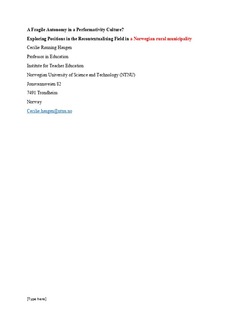A fragile autonomy in a performativity culture? Exploring positions in the recontextualising field in a Norwegian rural municipality
Journal article, Peer reviewed
Accepted version

View/
Date
2018Metadata
Show full item recordCollections
- Institutt for lærerutdanning [3441]
- Publikasjoner fra CRIStin - NTNU [37703]
Abstract
Internationally, the autonomy of schools and teachers is under pressure. In Norway, recent policies emphasise output control through national testing, combined with holding schools and teachers accountable for students’ results. Whereas recent research documents that the autonomy of schools and teachers is weakening in Oslo, there is little research on the rural parts of Norway. Recent political intentions aim to improve the results by establishing a better learning environment and classroom management. These intentions are related to the regulative discourse, ‘the rules of social order’, which is crucial to control as it dominates the instructional discourse. Two different projects were implemented in a rural municipality. Analysing their positions on three levels (author, actor and identity) this study finds considerable autonomy from the state in the pedagogic recontextualising field. However, this autonomy may be fragile as the teachers seem to have surrendered personal values. If teachers are disciplined, then the state may effectively reduce the potential discursive gap by reducing the autonomy of key agents in education. Investigating teachers’ rationalisations is imperative if we are to understand the relations between interests, ideology and class, and thereby the potential for autonomy in the recontextualising field in a performativity culture.